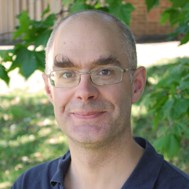Reading professor shines spotlight on science
Release Date 20 June 2011

A professor at the University of Reading has been awarded a science fellowship to champion research to schools, the media and the public.
Professor Mark Hodson, in the School of Human and Environmental Sciences, has received a Science in Society Fellowship from the Science and Technology Facilities Council (STFC).
It will provide teaching cover for three years for Professor Hodson to showcase the use of synchrotron light sources (and specifically Diamond) in environmental science.
Synchrotron light sources are particle accelerators - machines that accelerate electrons close to the speed of light. Scientists use this synchrotron light, which is 10 billion times more intense than the Sun, to delve deep into the atomic and molecular details of the world around us. Diamond, at Didcot, is the UK's national synchrotron facility.
Science in Society Fellowships are aimed at those with significant research experience who have demonstrated a track record in outreach or communications work.
Professor Hodson said: "I am looking forward to engaging with and entertaining schoolchildren, teachers and interest groups and convey the exciting research being carried out at STFC-funded light sources. Research at Diamond is answering important environmental questions and challenges that are of great interest to young people.
"I hope too that I can demystify the lives of scientists and the science they do and encourage more people to think about pursuing a career in environmental science."
ENDS
For more information please contact Rona Cheeseman in the press office on 0118 378 7388 or email r.cheeseman@reading.ac.uk
Notes to editors
The School of Human and Environmental Sciences teaches and researches topics across the spectrum of archaeology, geography and environmental science. The School aims to further the understanding of environmental systems, human communities and their interactions in the past, present and future.
It seeks to provide qualified people and knowledge to guide policy in sustainable development, contribute to the national economy, and to acquire an understanding of the past.